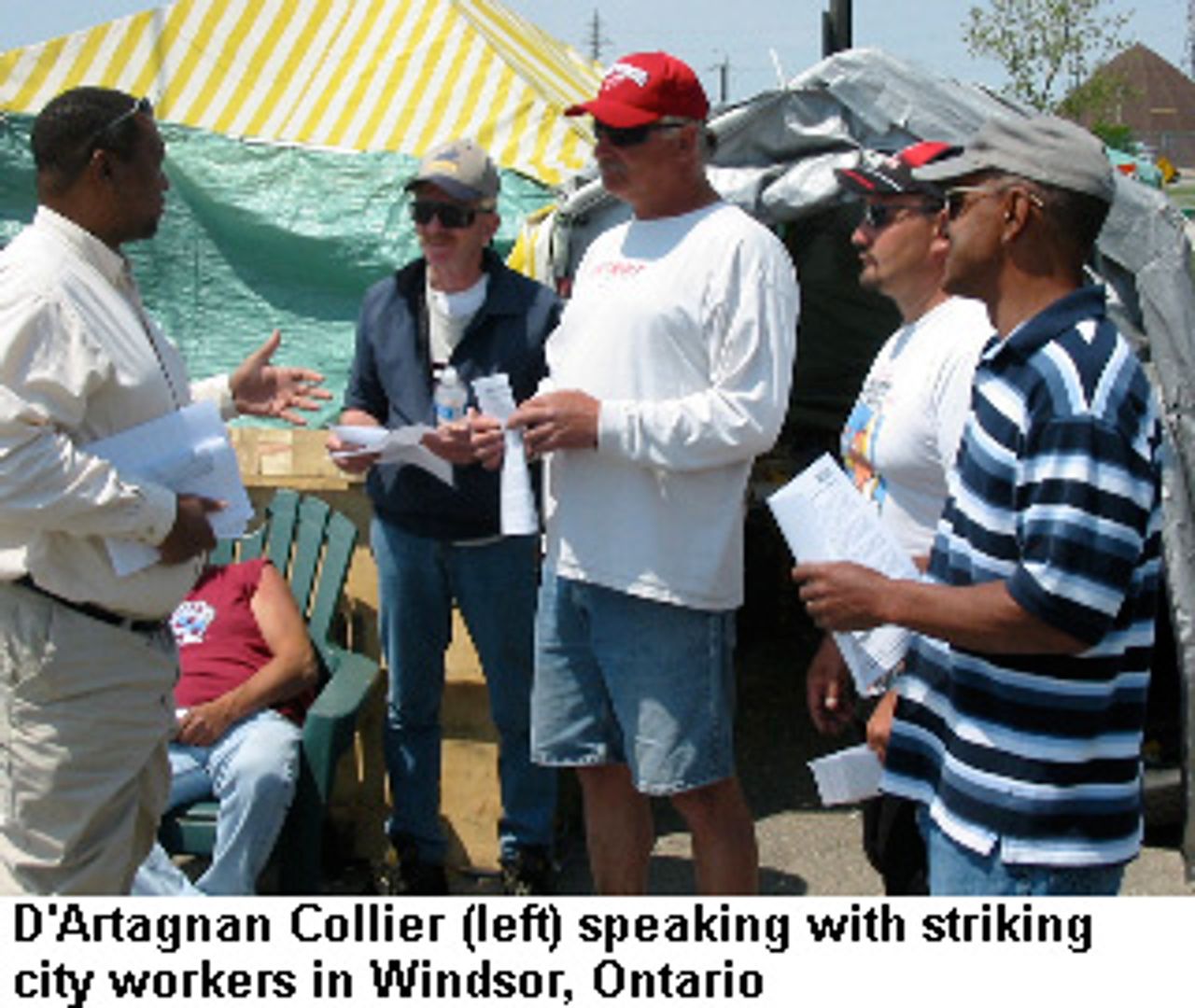D’Artagnan Collier, the Socialist Equality Party candidate for mayor in Detroit, visited striking city workers in Windsor, Ontario, on Friday.
Over 1,800 municipal employees of CUPE (Canadian Union of Public Employees)—among them waste disposal, maintenance and city park workers—have been on strike in Windsor since April. The city government is seeking to alter the terms of the workers’ contracts so that new hires receive less in retirement benefits than current employees. Workers told Collier that they feel they are fighting for all current and future city workers.
Collier is himself a city worker in Detroit. On behalf of the US and Canadian Socialist Equality parties, he declared support for the workers’ struggle.
Workers told Collier about the issues at stake in the strike. “These striking workers are the best,” said Rob. “They’re looking to break us, just like they did to the CAW [Canadian Auto Workers] so that they can go after the rest of the city workers. We’re drawing a line. It’s not about us. It’s about the next generation of workers, who won’t have retirement benefits if city hall gets its way.
Three days of negotiations broke down last week, in spite of major concessions offered up by local CUPE presidents. “We agreed that post retirement benefits for new employees could end at age 65, and we offered to cost share an optional benefits plan for them. The City refused,” said Jim Wood, president of CUPE 82 in a press release. “I actually made a verbal offer to get our members back on the job tomorrow.
Wood had earlier told the Windsor Star that he has “reached out” to Windsor Mayor Eddie Francis, and that he would not leave the local hotel where negotiations are taking place until he had a contract in hand.
 Speaking with the striking Windsor workers, Collier explained that the situation they confront is the same that prevails across the border in Detroit. The struggle of Windsor’s municipal employees is in fact an international struggle, Collier said. Workers on both sides of the border, and all over the world, have to unite in a common fight against capitalism.
Speaking with the striking Windsor workers, Collier explained that the situation they confront is the same that prevails across the border in Detroit. The struggle of Windsor’s municipal employees is in fact an international struggle, Collier said. Workers on both sides of the border, and all over the world, have to unite in a common fight against capitalism.
Collier explained that this required a political approach to the crisis confronting the working class. “It doesn’t matter if they’re Democrats or Republicans, Tories or Liberals or NDP [New Democratic Party],” Collier said. “They’re all representatives of capitalism.”
“We need a new party, a workers’ party, that can unite us internationally,” Collier said. “There has to be a vast redistribution of wealth. We have to take power out of the hands of the capitalists and their political tools in Washington and Ottawa.”
Workers expresed enthusiasm for Collier’s approach. They said they were interested in linking up with workers in the US, and asked many questions about the situation confronting the working class in Detroit and Michigan.
“It’s the exact same here,” said Dan, a worker with more than 20 years on the job. “There are no jobs. Most of the young people head out west hoping to find something there.”
Workers expressed anger toward the local city government. “They say there’s no money, but 400 city managers just gave themselves a 14 percent raise.”
 Collier pointed to the bankruptcy of identity politics in both the US and Canada. “Your mayor here boasts about being of Lebanese ancestry,” Collier said. “Race and nationality don’t matter. In the US, we have Obama as president. His administration has handed trillions over to the banks, and is forcing huge concessions on the auto workers. The city of Detroit is controlled by black politicians who are dedicated to putting the social crisis on the backs of the working class.”
Collier pointed to the bankruptcy of identity politics in both the US and Canada. “Your mayor here boasts about being of Lebanese ancestry,” Collier said. “Race and nationality don’t matter. In the US, we have Obama as president. His administration has handed trillions over to the banks, and is forcing huge concessions on the auto workers. The city of Detroit is controlled by black politicians who are dedicated to putting the social crisis on the backs of the working class.”
The striking workers have been the victims of a low-class smear campaign by the local newspaper, the Windsor Star, which has sought to portray the strikers as violent thugs intent on holding the city hostage.
Collier witnessed something entirely different. The workers were picketing a private contractor garbage service. They expressed anger toward the owner, but not the employees.
“These guys make minimum wage. It’s not their fault. One of them is my cousin. We’re still on good terms,” said Dan. Strikers greeted the garbage workers as they left on their shift change.
Another worker told Collier that they take no pleasure in seeing garbage piled up and grass at city parks uncut. “We hate to see it like that more than anyone else,” he said.
Collier warned of the bankruptcy of the official trade union movement. “Workers can’t take a single step forward under the unions.” To illustrate the point, he offered the example of the United Auto Workers and the CAW.
“When autoworkers built the UAW,” Collier said, “they fought together on both sides of the border. But now the two bureaucracies pit US and Canadian workers against each other to see who can cut wages and benefits the most and offer ‘their’ capitalists the most exploited workforce.”
“For decades the unions have been saying that this is the only way to save jobs,” Collier went on. “But look at Detroit. Look at Windsor. The auto industry has been devastated on both sides. Yet the bureaucrats are still collecting their paychecks.”
Collier and an SEP campaign volunteer distributed copies of Collier’s statement, “For the unity of Canadian and American workers.” Two workers sat down to read it straight away. One said he agreed with the statement. “What they’re saying makes a lot of sense,” he said.
